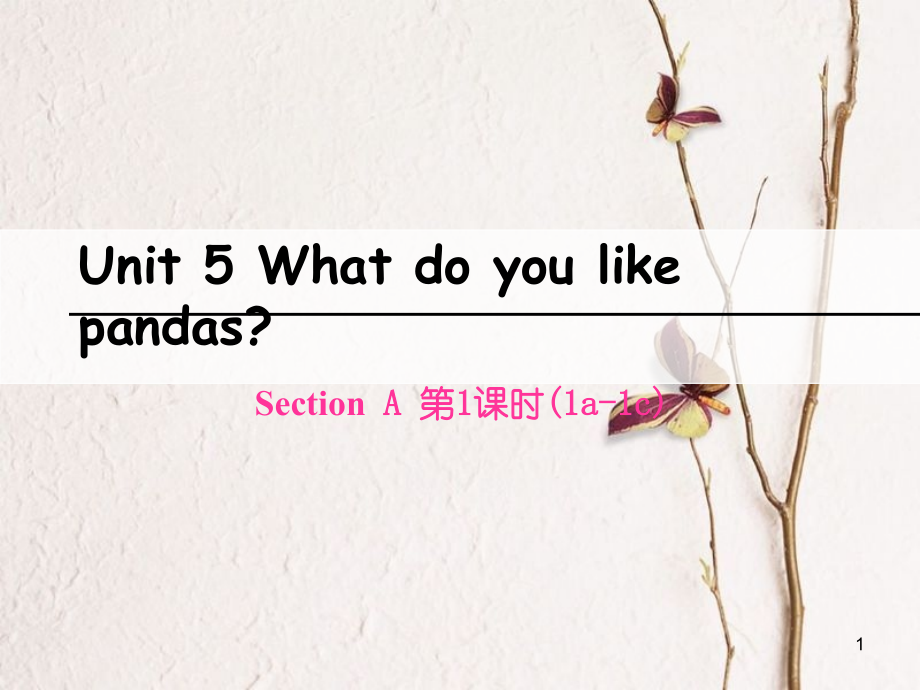《七年級(jí)英語(yǔ)下冊(cè) Unit 5 Why do you like pandas(第1課時(shí))Section A(1a-1c)課件 (新版)人教新目標(biāo)版》由會(huì)員分享����,可在線閱讀,更多相關(guān)《七年級(jí)英語(yǔ)下冊(cè) Unit 5 Why do you like pandas(第1課時(shí))Section A(1a-1c)課件 (新版)人教新目標(biāo)版(21頁(yè)珍藏版)》請(qǐng)?jiān)谘b配圖網(wǎng)上搜索�����。
1、Unit 5 What do you like pandas?Section A A 第第1 1課時(shí)課時(shí)(1a-1c)(1a-1c)1Who are they?tigerpandaelephent2giraffelionkoalaThey are all wild animalls.3Do you like animals?What animals have you seen in the zoo?Whats your favoriteanimal?Why?4Match the words with the animals in the picture.1atiger _elephant _k
2�、oala _panda _lion _giraffe _afcedb5Listen and check the()the animals you hear in 1a.1btiger _ 2.elephant _3.koala _ 4.panda _5.lion _ 6.giraffe _6cute interesting fun smart lazy beautiful1c.Practice the conversation with your partner.Then make conversations about the other animals in 1a.Use the word
3、s in the box.7Lets see the koala first.Why do you want to see them?Because they are very cute.1c8koala9Lets see the giraffes.Why do you want to see them?Because they are very beautiful.1c10giraffes11Do you like elephents?No,I dont.Why?I think they are very fun.Because in my mind,they are too lazy.1c
4���、12elephents13 1.first的用法的用法 first既可作既可作副詞副詞���,也可做,也可做序數(shù)詞序數(shù)詞和和形容詞形容詞�����。(1)作作副詞副詞時(shí)�,意為時(shí),意為“首先����,最初首先,最初”����,其反義�,其反義詞為詞為last。first表示順序作狀語(yǔ)����,修飾動(dòng)詞或表示順序作狀語(yǔ)��,修飾動(dòng)詞或句子��,可位于句尾�,也可位于句首���。句子��,可位于句尾�,也可位于句首����。如:如:Lets listen to the teacher first.Language points14(2)作作序數(shù)詞序數(shù)詞時(shí),意為時(shí)����,意為“第一第一”。序數(shù)詞前常加��。序數(shù)詞前常加冠詞冠詞the��。如果序數(shù)詞作表語(yǔ),則不加冠����。如果序數(shù)詞作表語(yǔ),則
5��、不加冠the����。如如:He is the first one to come to school.他是第一個(gè)來(lái)學(xué)校的人。他是第一個(gè)來(lái)學(xué)校的人�����。(3)作作形容詞形容詞時(shí)��,意為時(shí)���,意為“最初的���,首先的最初的,首先的”����,常用作定語(yǔ)。常用作定語(yǔ)。如:如:The first thing to us is to learn English well.對(duì)我們來(lái)說(shuō)首要的事就是學(xué)好英語(yǔ)���。對(duì)我們來(lái)說(shuō)首要的事就是學(xué)好英語(yǔ)。Language points152.why,because的用法的用法(1)why是是特殊疑問(wèn)副詞特殊疑問(wèn)副詞�,意為,意為“為什為什么么”���,常�,常用來(lái)詢問(wèn)原因用來(lái)詢問(wèn)原因�����。如:如:Why do y
6����、ou go to park at night?你為什么晚上去公園?你為什么晚上去公園����?Language points16(2)because作作連詞連詞,意為���,意為“因?yàn)?����,由因?yàn)?���,由于于”,用���,用?lái)來(lái)引導(dǎo)原因狀語(yǔ)從句引導(dǎo)原因狀語(yǔ)從句或用來(lái)或用來(lái)回答回答why引導(dǎo)的表引導(dǎo)的表原因的特殊疑問(wèn)句原因的特殊疑問(wèn)句����。如:如:I like English because it is very interesting.我喜歡英語(yǔ)����,因?yàn)樗苡腥ぁN蚁矚g英語(yǔ)����,因?yàn)樗苡腥ぁanguage points17單項(xiàng)選擇單項(xiàng)選擇()1.-_ do you like pandas?-Because they are v
7�����、ery cute.A.How B.Why C.Where D.What()2.Lets _ to the zoo this weekend.A.going B.goes C.to go D.goBD小結(jié)訓(xùn)練小結(jié)訓(xùn)練18用所給詞的適當(dāng)形式填空�。用所給詞的適當(dāng)形式填空�����。I like giraffes because they are very _ (interest)2.I want to see the tigers _(one)3.There are many _(tree)in the forest 4.There are two _(zoo)in our city5.Dolphins are very _(friend)to people.interestingfirsttreeszoosfriendly小結(jié)訓(xùn)練小結(jié)訓(xùn)練19完成當(dāng)堂測(cè)評(píng)作業(yè)完成當(dāng)堂測(cè)評(píng)作業(yè)20學(xué)習(xí)這件事不在乎有沒(méi)有人教學(xué)習(xí)這件事不在乎有沒(méi)有人教你���,最重要的是在于你自己有沒(méi)有你���,最重要的是在于你自己有沒(méi)有覺(jué)悟和恒心��。覺(jué)悟和恒心���。法布爾法布爾21
 七年級(jí)英語(yǔ)下冊(cè) Unit 5 Why do you like pandas(第1課時(shí))Section A(1a-1c)課件 (新版)人教新目標(biāo)版
七年級(jí)英語(yǔ)下冊(cè) Unit 5 Why do you like pandas(第1課時(shí))Section A(1a-1c)課件 (新版)人教新目標(biāo)版

